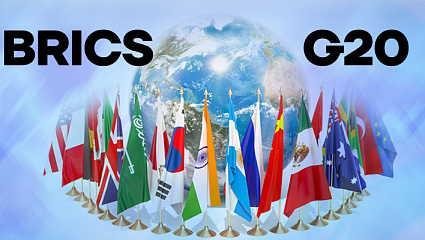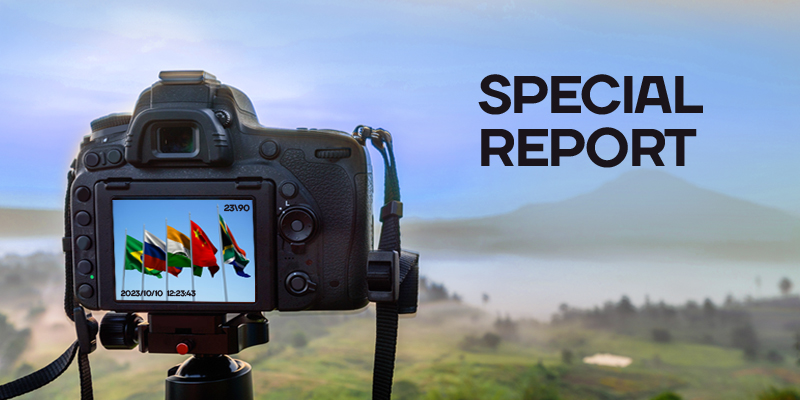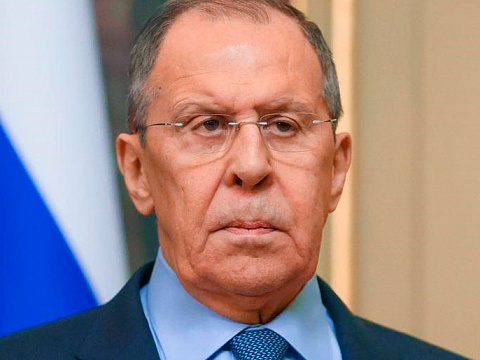Alexander Ageev: "Today is one of the most interesting moments in world economy and world history ever"
Founder and General Director of the Institute for Economic Strategies, Doctor of Economics, Professor of MGIMO, author of more than 600 scientific, journalistic and literary works.
Alexander Ageev talked to the TV BRICS correspondent Olga Bubnova about the prospects of BRICS for the next three years and possibilities of mutual domestic currency settlements between the countries.
The Institute for Economic Strategies was founded nearly 30 years ago. With what purpose did it appear then, and what is it doing today?
On the one hand, it was interesting in the country in '90s, as various freedoms extended, including the intentions to do business, and, on the other hand, anxiety mounted. And this combination of hope, joy and anxiety created the atmosphere for new initiatives. A group of my companions from the Institute of Economics of International Relations and the Institute of Economics of the USSR Academy of Sciences decided to implement this project, and it found support. We were practically the first non-state think-tank.
One of your objects of activity is BRICS. What will happen to BRICS in the next three years? Or is it risky to speculate like this in the modern world?
Actually, nearly a half of the world population lives in China and India. A huge share of the world GDP is distributed respectively. And of course, it is their development that sets the future. Because the changes we face today are epoch-making in terms of the bicentennial interval of the history of mankind. I mean, we are facing the formation of such economic structure, which, according to the statistical data, was likely at the beginning of the 19th century. Therefore, probably, today is one of the most interesting moments in world economy and world history ever. We are lucky to live in this period.
You mentioned China and India, and even Primakov said that Russia, China and India form the main triangle for the development of the new world, so to say. But in BRICS, there are other countries, the South African Republic and Brazil. What can you say about them?
The SAR is certainly the African leader, and when I came there for the first time, of course, I was shocked not only by infrastructure, not only by development, but by all its power. It is an industrial, highly developed country, with well-developed competence in science, technologies. Russia is developing a rather diversified trade and relations with South Africa.
Brazil, I have also visited it more than once, is mainly known to us by its carnivals or coffee, for example. And actually, it is a very powerful, industrialized country with strong energy industry, hydraulic power. This country develops the newest types of industry. The interests of these countries are pretty much the same, and regular summits, institutes created by the heads of these countries, they are all designed to support this cooperation.
Talking about institutes, the New Development Bank has been created recently. What is it created for, and how will it counterbalance the current world economic environment?
Sometimes there are unreasonable expectations that it will throw down a challenge to some other dominating currency systems. We, probably, have not gone so far yet. It is clear that dollar and an ultimately close to it currency euro are dominating today. The increasing share is held by yuan, pound sterling, and other currencies. This is a somewhat diversified currency system built on the monopoly of one world currency, i.e. dollar, since 1945.
BRICS countries have been saying for several years that they will turn to national currency exchange. When can it happen in perspective?
It is even happening today. But there are technical difficulties, and there are also psychological difficulties, because the world currency status means that this is going to be the currency for transactions, payments, accumulation. This is the currency that has a very important feature, such as stability. This is a convincing leverage of U.S. dollar as yet. The project is ploughing its way, but it is being implemented.
The main potential for BRICS is our human capital, one of your works is called "Two Demographic Threats for BRICS". Can you name the factors that do not promote, but interfere with the development of BRICS?
Perhaps, the word "interfere" is not so appropriate in demography. The main challenges for BRICS are connected with two processes providing for what is called demographic dividends: this is a share of young population, younger than 18, and a share of population unfit for work.
And comparing those who work, and those who still grow up, and those who have already earned their rest, then all countries will have a rather clear coefficient. The share of "pioneers" decreases, and the share of pensioners increases. It becomes a problem because the system of social security, for example, in all countries, including Russia, is poorly developed.
Therefore, we face a certain challenge in this sphere. We regularly undertake the analysis and assess the integrated power of the countries, and this is not only GDP, economic parameters, but also demography, territorial status, and this is also, of course, culture, religion, history objects, and so on.
Looking at the development of integrated power of the countries, we can see that China, India, Russia are already among the top ten world countries. But if we compare how the development is managed, what indicator is considered the most important, how to evaluate the instruments of development?
I do not know, maybe, education.
Mainly the level of child mortality. It’s child and infantile mortality that characterizes the efficiency of management. Strangely enough.
And how high is this level now, for example, in Russia?
In Russia the mortality rate decreases, but so far, it lags behind the international standards, though in the early '2010s it really decreased. Today it is increasing a little, this is not even the crucial thing. But we have about one million extra deaths every year. A million of people here die earlier than they normally would. All BRICS countries have pretty much the same issues.
Not only BRICS countries have common ideas and common problems.
Yes, common problems, and answers, and questions.
Talking a little more about Russia, what is its current economic status?
Russia is one of the richest countries in terms of natural resources. We are rich, but we live extremely badly. Frankly speaking, without statistical pettifogging, up to a half of the population is poor according to all international standards.
We have to solve this problem. And our place in the world can be understood according to such picture: a histogram with 9 beams. And the perfect condition is the one in which all these beams are more or less equally represented. Let's say, we are represented equally in everything, we should be a great country in every respect, it is great in respect of natural resources, and in terms of culture, it is great, science, education – the country is still great. Military power makes us a superpower, for example. And concerning the development of territories, this is the regional country, not great; concerning the population, we have been already bypassed by many countries, for some reason we do not want to give birth to children anymore. Why?
Talking even about dreams, meaning of this life, and so on. Russia is a country with a kind of jagged and uneven power profile. The same goes for China, a superpower in one respect, and difficulties in the other. The Chinese live more poorly than Russians, despite their developed level. Or, for example, Brazil. Once I heard a statement in South Latin America, something like we live in poverty, but with dignity. And many countries in South America live like that – poorly, but with dignity. This is a very serious indicator. Therefore, it is not enough to measure only economic indicators today.
It is no coincidence that in many countries, including China, they use indicators of happiness, satisfaction with life. What is all this economics for? For financial frauds? Or for the life quality? You ask a very serious question.
Initially, BRICS was created in order to change life both in the five countries and around the five countries. Is it really happening, or not?
The world economics is organized in such a way that any country, even the USA, with all their power, cannot implement their national interests without having an influence zone. For example, Turkey considers not less than 60 countries of the "Turkic" space. For example, the USA has a large number of allies, well, all Euro-Atlantic world. Russia creates its areas, economic unions. Fight for these spheres of influence for the companies, for the industries – it can be subdivided into four categories: all countries, enterprises, industries, regions, even people. There are leaders, and they, figuratively speaking, take the biggest benefits from their leadership.
Then we have what is called the province, which lives not in the leader status, but with the aid of import. We have a periphery: you import nothing, but you build your own, though rather bad, but still a business, an enterprise, a life. And finally, we have, as they call it, the deep boondocks. And all countries can be assessed according to these categories.
The meaning of economic progress and competition is to maximize within a country the number of those who belong to the leading, advanced category, because it has the biggest added value, and it has the greatest effect for the population welfare.
And if you have two-three episodes of leadership in your country, in Russia these are space, military-industrial complex and an oil and gas complex, and all the rest is either in the status of province, or periphery.
If you look at the figures of public procurement, you will see that no more than 10% belongs to the government and domestic production departments. No more than 10% means that we prefer to buy foreign things, thereby giving work to foreign companions, our labor brethren, but not to the Russian ones, therefore, we have such total figures.
You tell about economics enthusiastically, you give interesting examples. And what, in your opinion, is the most interesting and fascinating thing in scientific research? What publication are you working on?
I actually have 5 basic priority subjects on my desktop. Firstly, I finish the second edition of a work called "The Change of Hegemone"; this is a very serious subject connected with the reasons and consequences of the two world wars: the World War One and Two; how the world economic system evolved, how the leadership was distributed among different countries, just what we have just discussed with you.
There is another subject, I call it "The Enthusiasts' Highway", this is a documentary fiction. "The Enthusiasts' Highway" has double meaning: both heroic enthusiasts, and, on the other hand, an unbearable path as we know it.
Also, there is a number of dates in the history of the 20th century when different events happened on the same day, and they are connected by hidden threads, a kind of quantum flux, formally not connected, but making history. It will be a work of fiction, it completes the work on Nikolay Dmitrievich Kondratyev's biography.
This is the Russian economist number one, the one who was even disembarked from a ship when they deported hundreds of intellectuals from Russia, but he was disembarked because they needed him for working on a development plan for the country in 1922.
In 1930, he was arrested, wrote many works in Suzdal, and the materials revealed for the first time, they will become the basis for two versions of his life: the documentary one and, probably, the fictional one. I guess, it will be interesting to a reader, because this is the person making our pride, all-time legacy.
Another subject for my inspiration is a number of concerts I am making: music with lyrics by Nobel Prize Winners. Three Russian poets got the Nobel Prize: Dubrovsky, Pasternak and Bunin, Sholokhov specialized in prose. All in all, about 120 persons won it, and half of them are poets.
It will be a series of conceptual music concerts. In this kind of music, both music and texts matter.
Verses by Joseph Brodsky, are, of course, extremely difficult, conceptual in the spirit, they just bewitch, imply both catharsis and deep thought. This is yet another creative project I am engaged in.







 DIGITAL WORLD
DIGITAL WORLD



































